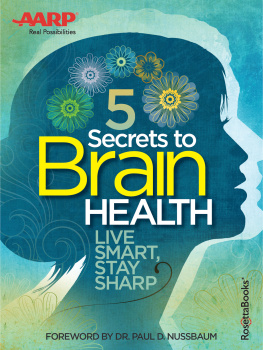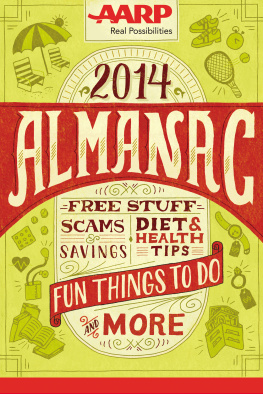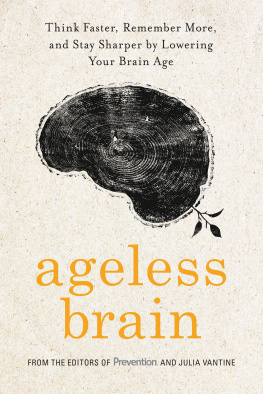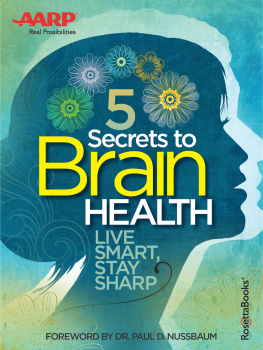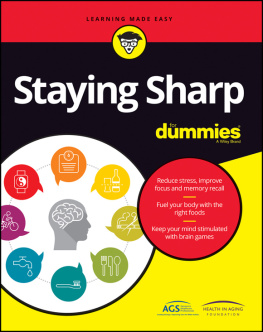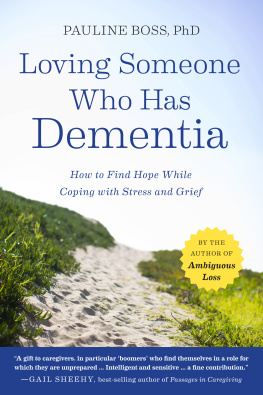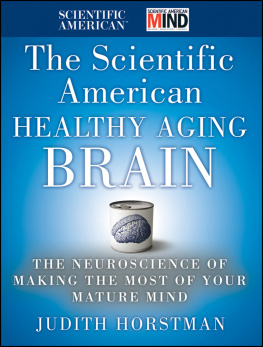
Copyright 2013 by AARP. All rights reserved. AARP is a registered trademark.
This ebook was produced by RosettaBooks.
Cover: Scott A. Davis, AARP Creative Director; illustration by Stephanie Dalton Cowan
Authors: Margery Rosen, with Dr. Armon B. Neel Jr., Lisa Davis, and Beth Howard
Editors: Betsy Carpenter, with Bill Hogan
Director, AARP Book Division: Jodi Lipson
Published by AARP, Washington, DC.
No part of this publication may be reproduced, stored in a retrieval system, or transmitted in any form or by any means, electronic, mechanical, photocopying, recording, scanning, or otherwise, except as permitted under Section 107 or 108 of the 1976 United States Copyright Act, without the prior written permission of the Publisher.
Limit of Liability/Disclaimer of Warranty: While AARP and the authors have used their best efforts in preparing this book, they make no representations or warranties with respect to the accuracy or completeness of the contents of this book and specifically disclaims any implied warranties of merchantability or fitness for a particular purpose. No warranty may be created or extended by sales representatives or written sales materials. The advice and strategies contained herein may not be suitable for your situation. You should consult with a professional where appropriate. AARP and the authors shall not be liable for any loss of profit or any other commercial damages, including but not limited to special, incidental, consequential, or other damages. The fact that an organization or website is referred to in this work as a citation and/or a potential source of further information does not mean that AARP and the authors endorse the information the organization or website may provide or recommendations it may make. Further, readers should be aware that Internet websites listed in this work may have changed or disappeared between when this work was written and when it is read.
Other AARP print and e-books are available at AARPs online bookstore, aarp.org/bookstore, and through local and online bookstores.
Library of Congress Cataloging-in-Publication Data:
ISBN ePub edition: 9780795335938
Contents
by Paul D. Nussbaum, Ph.D., ABPP, Clinical Neuropsychologist and Adjunct Professor of Neurological Surgery, University of Pittsburgh School of Medicine
The human brain is the single most magnificent miracle ever designed in the history of the universe. Weighing just 3 pounds, but demanding 25 percent of the blood from each heartbeat, your brain is the origin of every thought, emotion, movement, and dream.
Recently, neuroscience has taught us that our brains have neural plasticity, which means theyre dynamic and constantly reorganizing. We now know our brains can generate new brain cells (neurogenesis), and that environment and lifestyle can shape our brains. While we dont yet have a cure or even prevention for brain disease, we do have the ability to shape our brains for healthand it is never too early or late to get started.
I have studied the brain and behavior for more than 25 years, and my mission is to teach all humans, regardless of age or background, about this wonderful miracle that sits between our ears and how we all have the power to shape our brains for health throughout our lifespan. And with this easy-to-read and practical guide, you can get started.
The content of the book outlines five distinct pillars for brain health: eating smart, being fit, working your mind, socializing, and stressing less. These are the areas Ive been emphasizing in my own work, too, because research has shown they can make a difference. Each of these five chapters offers specific tips and activities that are fun to do. One added bonus is the section on medication side effects, a common cause of memory and concentration problems.
This book will add to the growing attention paid to brain health. Most important, by getting started today in one or more of these five pillars, you are shaping your brain to be as healthy as it can be and maintaining access to your life story. Dont just read Five Secrets to Brain Health: Live Smart, Stay Sharp yourself. Make sure your children and grandchildren read it, too, because it is important to attend to your brain health at the earliest of ages.
Get started today on your journey to brain health.
You pop a chicken in the oven to roast, call your sister about a graduation gift for your niece andyikes!you did it again. That unmistakable burnt-to-a-crisp smell is yet another sign that you cant remember anything anymore. To say youre worried is a serious understatement. Spacey moments happen to all of us, no matter how old we are. But when they happen at midlife, we panic.
Memory loss is a frightening thing. If youre worried about brain health, youre not alone. Research shows that Americans 50 and older are concerned about losing mental capacity. In fact, AARP found that staying mentally sharp is a top concern among its members.
Relax. The truth is, 80 percent of people over 70 do not have significant memory loss, says Rudolph Tanzi, Ph.D., director of the Genetics and Aging Research Unit at Massachusetts General Hospital.
And now many experts believe you can prevent or at least delay that declineeven if you have a genetic predisposition to dementia. Reducing Alzheimers risk factors like obesity, diabetes, smoking and low physical activity by just 25 percent could prevent up to half a million cases of the disease in the United States, according to a recent analysis from the University of California in San Francisco. Theres hope even for those senior moments.
A lot of people think that if theyre having memory problems, their memory is lost and gone for good, says Majid Fotuhi, M.D., Ph.D., a neurologist at the Neurology Institute for Brain Health and Fitness near Baltimore, Maryland. They dont realize the brain is kind of like their biceps. Both can be toned up at any age.
How? The prescription for brain health is rooted in five pillars:
- Eating smart
- Being fit
- Working your mind
- Socializing
- Stressing less
And studies show that no, its not too late to begin. Keeping your brain fit for life: Its easier than you think.
Antioxidants! Omega-3s! Anti-inflammatory diets! Can something you eat really help you rememberagainwhere you put your cellphone or reading glasses? If you add blueberries to your morning oatmeal or sip a glass of red wine at dinner, will your brain cells stay healthier longer?
Much of what we hear about the interplay between diet and brain health is based on preliminary research and then flooded in hype. As headlines have linked one food or another to Alzheimers disease and other illnesses, we have rushed to remove them from our diet. The problem is, as soon as one headline urges us to eat this, not that, it seems theres another saying just the opposite.
Why all the confusion? Proving conclusively which foods actually boost brain health is difficult and expensive, requiring large scale, long-term clinical trials. When youre eating blueberries, youre not eating just one nutrient, explains Gene L. Bowman, a brain nutrition researcher at Oregon Health & Science University. Youre eating a complex mixture of hundreds of them. Is it the antioxidants that improved cognition or the vitamins? Most likely, its the unique combination of all of them.
Still, its become increasingly clear that how you eat may counteract the effects of an aging brain. The best recipe is a diet that includes brain-building nutrients such as omega-3 fatty acids, antioxidants and certain vitamins, and steers clear of foods that promote high blood pressure, high cholesterol, obesity and diabetes, says Majid Fotuhi, M.D., chair of Marylands Neurology Institute for Brain Health and Fitness and author of the upcoming
Next page
